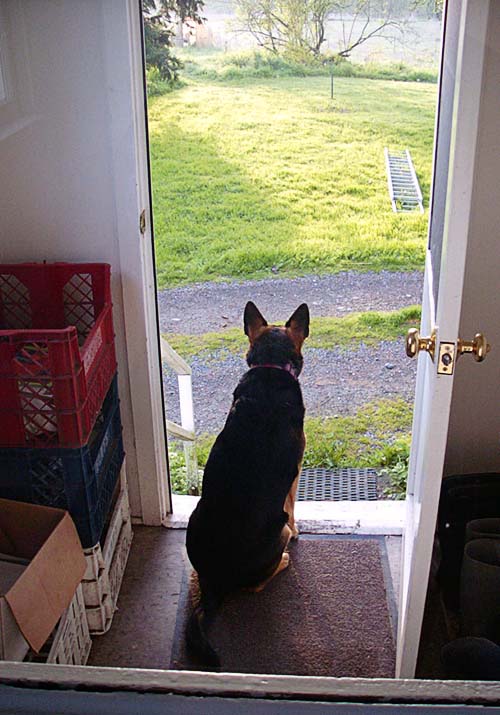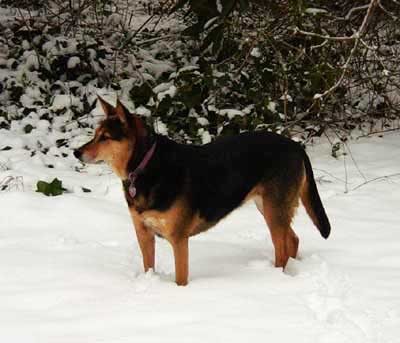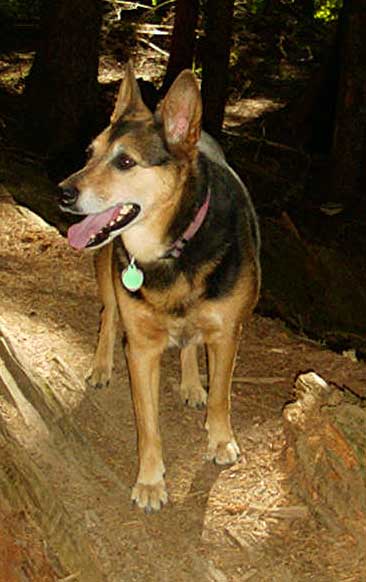‘Homage to Smokey, Who Swims with Seals’ by Bruce Brown

SMOKEY DIED early this morning and I don’t even know how to begin to express my grief.
She ran a mile with me three days ago on Thursday morning, all the way to the park in town and back, and seemed full of joie d’dog.
I remember seeing her trotting with her nose down scenting the dewy, sun-lit grass as she passed. I also remember thinking maybe she got into something she wasn’t supposed to eat (she lagged behind and I had to call her).
We had a short run on Thursday evening in the rain and then on Friday morning she clearly wasn’t well. She didn’t eat or drink all day Friday and then on Saturday she was the same, although she drank some water late in the afternoon.
During this period she was very hang dog and followed me around the house wherever I went, even though it was clearly a labor for her. A couple years before when she ate something bad, she was down for two days and the rebounded on the third, but this time was different.
Rose Anne and I went to a party at some old friends’ in Bellingham on Saturday night, got back home to Sumas around midnight, and went straight to bed. Early that morning — it was 1:20 am — by a horrible howling cry of pain from Smokey in the living room. I went to her and found Smokey fat-out on the rug. At first I thought she was completely comatose, but Rose Anne said she could see Smokey’s eyes flicker when I bent over and spoke to her.
I called the local vet’s after-hour line and discovered that the closest 24 hour small animal vet was 25 miles away on the outskirts of Bellingham. So Rose Anne and I loaded Smokey in the van and sped back into Bellingham. It took about a half hour, and by the time I carried Smokey through the vet office door, she was dying.
The two vets on duty never even had a chance to examine her. They had to go straight into CPR and life support, and after about 15 minutes of frantic work, they said they couldn’t save her. She was gone at 2:15, less than an hour after she woke me with her cry. So I carried her back out, put her back in the van and drove her home. We were back in Sumas a little after 3 in the morning.
There was a break in the clouds and I could see some stars, so I put her body on a bed of cardboard in the garden cart and let her body lie out under the stars one last time, like she loved to do when we went together on bike camping trips to eastern Washington.

* * *
SMOKEY WAS one of those exceptional, once-in-a-lifetime dogs. She was intelligent, obedient and utterly silent except when someone unknown approached the house (we called her Smokey because she was “silent like smoke”).
She was my companion, my housemate, my friend and my discipline in getting me to run twice every day no matter what the weather. Most of all, though, she just loved me, and I really, really appreciated that in what was otherwise the darkest and most emotionally painful period of my life.
A mongrel of indeterminate mix, Smokey had a pointed snout, rather large erect ears, short glossy hair and a thick bushy tail. Many theories were put forward about her possible parentage until my friend Marilyn declared authoritatively and apropos of nothing at all, “German shepherd / beagle mix. Seriously, she’s got the shepherd’s color, snout and ears, and the beagle’s coat and tail. You can see the beagle in her size too, because she’s about 3/4 shepherd size, and her bones are lighter than a shepherd’s.”
I am only slightly embarrassed to admit that I had a raft of silly baby talk names and terms of endearment for her — Smoke Dog, Dogner, Woofner and Jingle Woof (after the sound of the tags on her collar), Chum Dog, Chum Dogner and just Chum Chum — but she was a dignified being, more regal and refined in temperament than boisterous and playful. And she was knowing. Part way through our last mountain bike trip to eastern Washington last fall, she sat down next to me and laid a lump on her neck under my hand. I knew then she was telling me she was sick. I had the lump removed, but three months later, she was dead at age 14.
I buried Smokey under the two big old filbert trees on the edge of the north pasture because she loved walking there, and considered all the field mice there to be her personal possession. Just as I was putting the last dirt on her grave and stomping it down with my boots, I heard a sound and turned. It was the wind moving though the long, dead grass, giving it a motion like when Smokey walked through it, and I felt her spirit moving beside me then. I felt that deep, deep connection that happened when we ran together, when she was trotting easily in the front with her senses all alert, and I was jogging after.
I had a system of low clicks and snorts and whoofs that I used to communicate with her vocally on the run. I developed them by listening to the noises she made (she was not in fact entirely silent, but she never, never barked needlessly; if she barked, you knew it was for real). Most of the time, though, I didn’t need these low, barely audible doggy noises that passed between us. They were just to remind her what we were doing, e.g., “we’re gonna stay on this side of the street to crosswalk and then cross there.” Sounds preposterous maybe, but I could really communicate that sort of thing to Smokey, and she would do it.

I remember once she and I and the County dog catcher arrived at the intersection in front of the Sumas elementary school at the same time one sunny morning. There were ten zillion kids running around and I didn’t have Smokey on a leash because she was never on a leash. I thought to myself, “oh great, Smokey and I are gonna get a ticket now for sure.” But I was able to keep Smokey under such close voice command — she trotted right beside me in the crosswalk — that the dog catcher didn’t even blink at us as when passed right in front of the grill on his truck.
Because Smokey and I ran together religiously for over a decade — a mile twice a day, seven days a week, 365 days a year — Smokey was easily the best known dog in the entire town of Sumas, WA. Scores of people knew her by name, and spoke to her whenever we trotted past. And for a half a decade around the turn of the century, she was also a fixture on the local mountain bike scene, logging hundreds of back-country trail miles with me, my friend Mark and his dog Toad on Sumas Mt., Vedder Ridge and Galbraith Mt.
Mostly, though, Smokey and I were a pack of two, and each of us was stronger for it, or at least I was. Smokey extended me with her keen senses of smell, hearing and sight, and sometimes just her plain doggishness. I remember one November night about five years ago. Smokey and I were jogging back from the town park in the dark when we were accosted by a group of young punks.
They didn’t actually show themselves, they just yelled obscenities and insults at Smokey and me from the shadows by the grade school when we turned the corner nearby. Sumas is about as sleepy as small American towns get — my father used to call it “the town that time forgot” — so this kind of routine, low-grade urban hooliganism was completely unheard of here.
Smokey and I were jogging away from the taunts when I thought — wait a minute, I don’t want this in my town — and stopped dead in my tracks. Then I turned around and did something that sometimes gets people killed. I started running straight at the dark place where the voices were coming from, and Smokey instantly moved to the point, loping ahead of me with an easy, confident, dog-on-the-hunt gait.
The kids didn’t like the look of this at all, and by the time we got to the school a few seconds later, they had all broke and fled, never to return. It didn’t make the news or anything, but in that moment Smokey made a small but measurable contribution to the public safety of the town that was her home for 12 years.
Not bad for a dog that never bit anything in her entire life but field mice, as far as I know. In fact, another of exceptional qualities was her unwillingness to bite, even when painfully provoked. During the last few months of her life, among the medical indignities that were heaped on her, I had a growth on her nose biopsied. This required cutting a chunk of nose flesh off, and then closing the wound with a couple sutures.
I forgot to take her to the vet and so there came that inevitable weekend when she needed the stitches out (more than needed them out, actually), and the vet was closed. My friend Mark, who is both an old riding buddy of Smokey’s and a medical doctor, volunteered to give it a try.
And so Dr. Mark, as my kids called him when he was our family physician, managed to successfully get a stitch out of Smokey’s nose without restraint or sedation. She yelped from the pain, but she did not bite. Try that with your average dog!

* * *
A FEW minutes after I finished burying Smokey, my daughter Laurel arrived. I could tell she’d been crying. She had gotten the news in Bellingham from my daughter Shanna in New York, who was the only one I could get on the phone on Sunday morning. We went out to Smokey’s grave immediately, and stood there together for a while. Laurel laughed when she saw that I’d put Shanna’s old pink snow saucer on top of the new grave. We talked about getting a headstone or planting a tree or a flowering bush.
Laurel recalled how she’d campaigned for Smokey when she and Shanna and my ex-wife, Lane, had gone to pick out a dog at the Pound. She said they’d looked at all the cute puppies first, but then she noticed Smokey, who was the Pound’s PR dog, meaning she visited nursing homes and didn’t have to live in a cage.
And so we got this dog that was about two years old and perfectly trained. We never knew what her story was, except that there had to be a story behind why such a marvelously trained dog ended up at the Pound. Maybe her person was in a car crash, or she was visiting Bellingham with her people and somehow got scared and ran and didn’t know where she was.
The very first time I ran with her, though, she instantly matched my stride and locked into my gait, so that we moved together without any stress or tugging at all. And I quickly realized that I didn’t even need to have her on the leash because she was entirely obedient to voice command, even under fairly serious cat provocation.
It wasn’t that Smokey didn’t pull your standard assortment of dumb-ass dog stunts — it’s just that she learned. We had a long list of things that Smokey only did once, including tangle with a skunk in the chicken house and chase after the manure spreader. She was also unusually intuitive about what the people around her wanted to do. Usually this was a plus, although not always. Spelling out words like “walk” or “vet” didn’t seem to fool her much; nor did hiding pills in hamburger or other tempting things to eat.
As we stood on the edge of the north pasture by Smokey’s grave, Laurel reminded me of a time when we were staying on the beach at Hartstene Island in Puget Sound. Seals frequently hunted salmon just offshore and they liked to bark back and forth to each other in the twilight. After several evenings of this, Smokey swam out to investigate a seal that she was certain had barked at her. It was anxious moment — you don’t want your dog tangling with a seal in the water — but I called to her and she promptly returned to shore. After that we called her “Swims With Seals,” a la the Kevin Costner movie, Dances With Wolves.
Laurel also recalled how devoted Smokey became to me, especially during the last half decade that Smokey and I lived alone together in Sumas. “You were it for her, Dad.” In a similar vein, Lane used to describe Smokey as “Bruce-atropic,” meaning she always turned toward me the way heliotropic flowers always turn toward the sun. None of my women friends have been particularly keen about Smokey because none of them really felt welcomed by the Smoke Dog. “When she looks at me,” Dale laughed once, “it’s like she’s thinking, ‘you hussy.'”
But Laurel also said, “when Smokey came to be with us she was exactly what I needed.” I asked her what she meant, and she replied, “When Smokey came, I felt I was loved. I felt somebody was paying attention to me and noticing how I felt.” Hearing Laurel say this gave me a real pang because I think it’s true on both ends — that Laurel wasn’t getting the love she needed from Lane and me, and that Smokey loved all of us completely.
Among her many sterling qualities, Smokey had a huge heart and a huge capacity to love. Loving our family — Laurel, Shanna, Lane and me — was her job, and she gave it her all for more than decade. She wasn’t able to love hard enough to hold our family together, but that was not her fault.
Speaking personally, I can say she was truly there for me in a very hard time, and I truly loved her for it.

* * *
I CAME home to sleep alone in the big house in Sumas tonight because I believed Smokey’s spirit would be here tonight, and right after I got into bed, after I’d sighed and I was just laying there waiting for sleep, I think I felt her around me for just a moment, and she felt light and happy. I hope that was true.
— Bruce Brown
January 29, 2006




